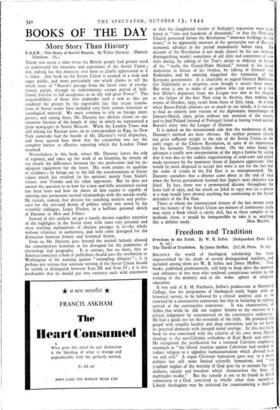BOOKS OF THE DAY
More Story Than History
U.S.S.R.: The Story of Soviet Russia. By Walter Duranty. (Hamish Hamilton. 15s.) THERE was never a time when the British people had greater need to understand the structure and aspirations of the Soviet Union ;
nor, indeed, has this necessity ever been so clearly appreciated as it is today. Any book on the Soviet Union is assured of a wide and eager public, and more particularly one which claims to tell the whole story of " Russia's passage from the larval state of revolu- tionary pariah, through an indeterminate cocoon period of half- friend, half-foe to full acceptance as an ally and great Power." The responsibilities of those who undertake such a task as this are rendered the greater by the regrettable fact that recent transla- tions of Soviet works have included very little serious historical or sociological material. We must continue to rely on foreign inter- preters, and among these, Mr. Duranty has obvious claims on our attention because of the length of time in which he represented a -great newspaper in Soviet Moscow. When the London Times was still relying for Russian news on its correspondent in Riga, its New York namesake had the benefit of Mr. Duranty's vivid dispatches, and those quoted here show that the censorship was not the complete barrier to effective reporting which the London Times assumed.
Nevertheless, in this book, where Mr. Duranty leaves the role of reporter, and takes up the work of an historian, he reveals all too clearly the differences between the two professions and his in- adequate equipment for the latter. His work retains its qualities of vividness ; he brings out to the full the transformation in Soviet values which has resulted (in his opinion) mainly from Stalin's victory over Trotsky and his other opponents. But he does not answer the question as to how far a new and fully articulated society has been born and how far above all that society is capable of entering into permanent normal relationships with the outside world. He reveals, indeed, that distaste for searching analysis and prefer- ence for the personal drama of politics which was noted by his erstwhile colleague, Louis Fischer, in a brilliant personal sketch of Duranty in Men and Politics. Instead of this analysis we get a hastily thrown together narrative of the highlights in the Soviet story with some very personal and often startling explanations of obscure passages in it—the whole without reference to authorities, and with some disregard for the distinction between history and historical fiction. Even so, Mr. Duranty goes beyond the normal latitude allowed the contemporary historian in his disregard for the pedantries of chronology and geography. It is curious, but no more, that so America-conscious a firm of publishers should pass the attribution to Washington of the warning against " entangling alliances " ; it is perhaps not serious that someone writing of the Soviet Union should be unable to distinguish between Ivan III and Ivan IV ; it is less pardonable that he should put into currency such wild statements as that the slaughtered victims of Stolypin's repression were num. bered in " tens and hundreds of thousands," or that the Orthodox Church possessed before the Revolution " immense holdings of real
estate," or be apparently unaware of the spectacular rate of Russia's economic advance in the period immediately before 1914. His
account of the Revolution is not made clearer by his use (without distinguishing marks) sometimes of old style and sometimes of new style dating, by talking of the Tsar's desire to abdicate in favour
of his " uncle, the Grand-Duke Michael," instead of his actual abdication in favour of his brother, by talking of General (sic) Rodzianko, and by omitting altogether the formation of the Kerensky government. It is charitable to regard General Bukhonin (for Dukhonin) as a misprint, even though it occurs three times.
But what is one to make of an author who can assert as a fact that Hitler's departure from the League was due to his chagrin at the failure of the first Nazi coup in Austria, thus making the events of October, 1933, result from those of July, 4934. At a time when Russo-Polish relations are so much in our minds, it is curious to find an entirely new version of the diplomatic interchanges of January-March, 1920, given without any mention of the source, and to find Poland (instead of Portugal) listed as having voted against Russia's entry into the League of Nations.
It is indeed on the internatiorial side that the weaknesses of Mr. Duranty's method are most obvious. He neither pictures clearly nor gives sufficient weight to the role of the Soviet Union in the early stages of the Chinese Revolution, in spite of its importance for his favourite Trotsky-Stalin theme. On the other hand, he advances a totally new interpretation of the 1932-3 famine by saying that it was due to the sudden requisitioning of seed-corn and petrol made necessary by the imminent threat of Japanese aggression. One would be more disposed to accept this were it not for the fact that the order of events in the Far East is so misrepresented. Mr. Duranty considers that a détente came about at the end of 1932 when the Soviet government learned that Japan's next objective was Jehol. In fact, there was a pronounced détente throughout the latter half of 1932, and the attack on Jehol in 1933 was (as a glance at a map would have shown) anything but comforting to the Soviet defenders of the Far East.
Those to whom the international history of the last twenty years and the history of the Soviet Union are matters of continuous study May enjoy a book which is rarely dull, but as these samples of its methods show, it would be irresponsible to take it as anything


























 Previous page
Previous page